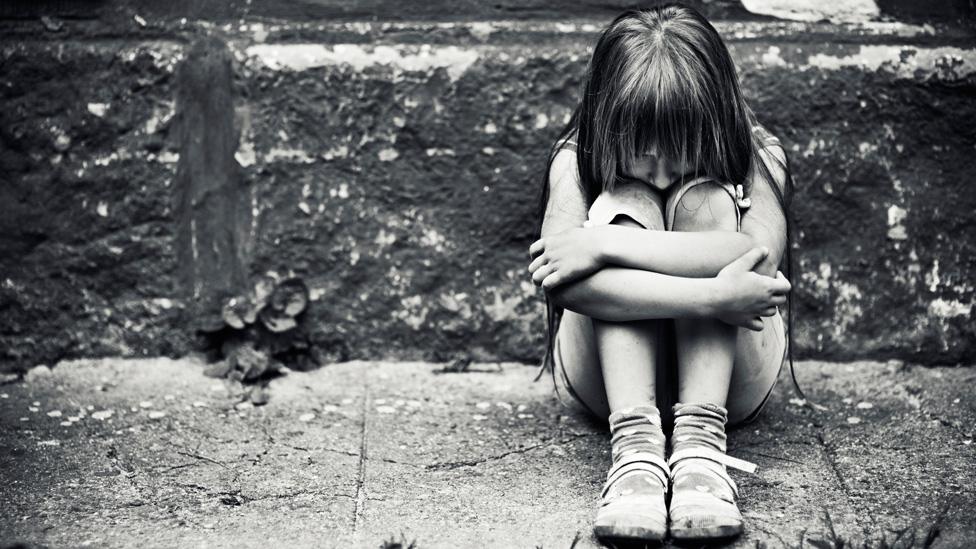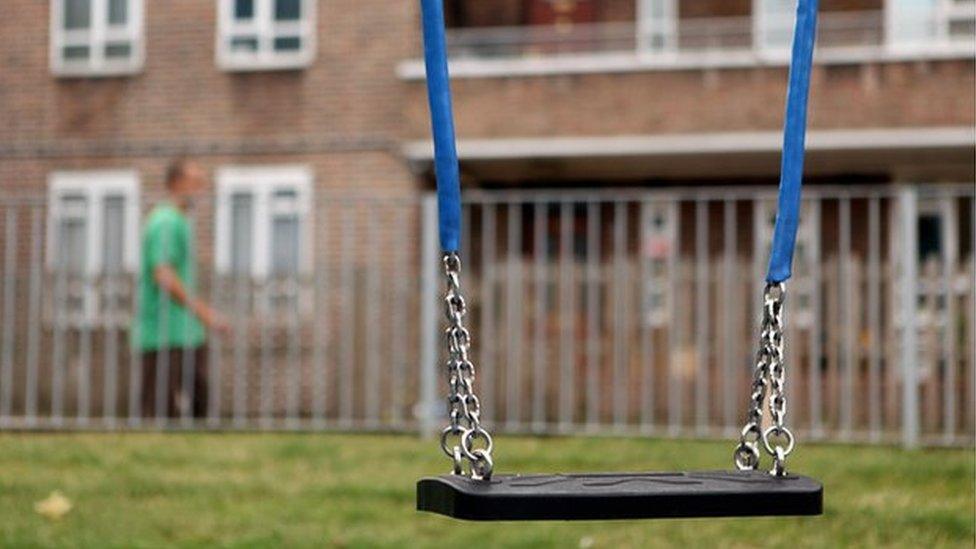Child poverty: Fears welfare changes could hit 50,000
- Published
- comments

Efforts to tackle child poverty and low incomes in Wales are being "damaged" by UK government welfare and tax reforms, it has been claimed.
An Equality and Human Rights Commission report estimates there could be 50,000 more Welsh children in poverty by 2021.
Children's Minister Huw Irranca-Davies warned of "profound hardship".
The UK Government said its reforms offered parents tailored support to help them into work, "which remains the best route out of poverty".
The EHRC has examined potential impacts of reforms since 2010 and what they might mean for people over the next three years.
It looked at UK data from the Family Resources Survey (FRS) and the Living Costs and Food Survey (LCF), with analysis by Landman Economics and Aubergine Analysis.
It estimates:
Households in Wales with three or more children will lose at least £900 a year on average by 2021-22 from the two-child limit on most benefits, tax credits and universal credit (UC) introduced in 2017
20,000 more households - and 50,000 more children in Wales - could be in relative poverty following the reforms as a "best estimate"
But increases in child poverty for Wales and Scotland (around 8% for both countries) are forecast to be smaller than for England (just under 11%). It puts this down to the larger gap between rich and poor in England
Those in the second lowest income bracket are the worst hit, with a suggestion these households in Wales could lose more than £1,000 a year
Disabled people and single parents in Wales will be disproportionately affected
It is estimated that around 200,000 children are currently living in poverty in Wales. This is broadly defined as living in a household where the income is less than 60% of the median income after housing costs are counted.
The Welsh Government had set a target of eliminating child poverty by 2020 but claimed just over a year ago that welfare reforms had made this unachievable.
In the analysis, the EHRC estimates the proportion of children in relative poverty in Wales could rise to 37.4%.
However, poorer families in England will lose out more than their counterparts in Wales and Scotland because the devolved governments have introduced policies to mitigate the impact of benefit and tax credit cuts, the report says.

You might be interested in these stories:

Schemes have also been brought in to help those on lower incomes cope with the reductions in council tax support.
Another reason is that rent is generally higher in England compared with Wales or Scotland so the restrictions on housing benefit have been more severe for English claimants.
Mr Irranca-Davies still believes urgent action is needed from the UK government to stop the most disadvantaged people being affected.
He added: "It is essential that these policies are revisited as a matter of priority and rigorous equality impact assessments are undertaken in order to safeguard the wellbeing of those who are most vulnerable."
Single mother Sabrina Cresswell, 35, from Cwmbran works part-time but says it is hard on working tax credits
Sabrina Cresswell, 35, from Cwmbran, Torfaen, works a few hours a week for a local authority in another area. She is a single mother with a seven-year-old autistic daughter and her closest relatives are her elderly grandparents.
Ms Cresswell receives council tax support, housing benefit and working tax credit. She said money was tight and she has to make choices which have in the past included deciding whether to buy food or nappies.
She said without her close friends around her she would not know where to turn. "I love working but unless you're working 16 hours they don't consider child care costs," she told BBC Wales.
"Generally when you're working, I think they assume you're going to be fine so they strip all of the benefits down. But as a single mum I do all the hours I can."
A UK government spokesman said: "The latest figures show that the number of children living in absolute poverty in Wales has fallen by 100,000 over the past seven years."
"We know there is more to do to ensure that every child gets the very best chances in life, and our welfare reforms offer parents tailored support to help them into work, which remains the best route out of poverty."
The spokesman said £90bn a year was spent on welfare to support those who needed it most and the report did not take into account changes the UK Government had introduced since 2010.
"The EHRC itself acknowledges that the impact of certain policies have been over-estimated in its report, which would lead to higher poverty projections," the spokesman added.
- Published19 January 2018

- Published7 March 2018

- Published26 January 2017
